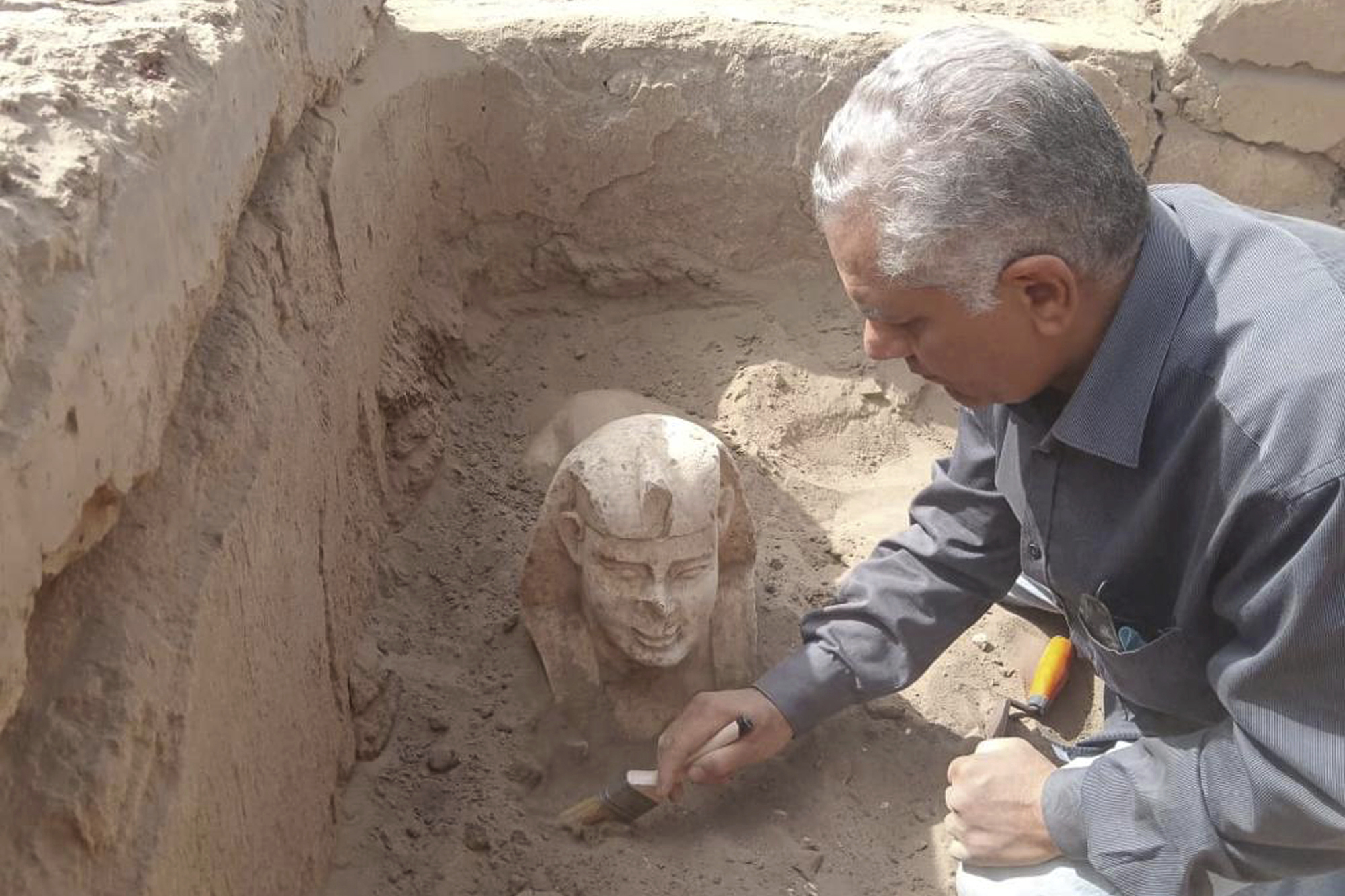Egyptian archeologists discover Sphinx from 1st century A.D.


A free daily email with the biggest news stories of the day – and the best features from TheWeek.com
You are now subscribed
Your newsletter sign-up was successful
Archeologists in Egypt have discovered a Sphinx-like statue that likely dates back to the time of Ancient Rome, authorities said Monday.
Egypt's Ministry of Tourism and Antiquities said in a translated statement that archeologists discovered "a limestone statue...in the form of a Sphinx." The artifact was found inside "a limestone cabin dating back to the Roman era." The discovery occurred near the Hathor Temple in Qena Province, 280 miles south of Cairo.
Experts believe that the Sphinx depicts the Roman emperor Claudius, who ruled the Roman Empire from A.D. 41 to A.D. 54. The Associated Press noted that Claudius is credited with having "extended Rome's rule into North Africa." A statue honoring Claudius would not be an uncommon occurrence, as The Washington Post reported that "Ancient Egyptian Sphinxes often represented a king or royal with the body of a lion, as a symbol of might and power."
The Week
Escape your echo chamber. Get the facts behind the news, plus analysis from multiple perspectives.

Sign up for The Week's Free Newsletters
From our morning news briefing to a weekly Good News Newsletter, get the best of The Week delivered directly to your inbox.
From our morning news briefing to a weekly Good News Newsletter, get the best of The Week delivered directly to your inbox.
This new statue is much smaller than the world-famous Sphinx at the Pyramids of Giza, which towers over tourists. However, experts still marveled at the find, with Dr. Mamdouh Damati, a former minister of archaeology and professor of archaeology at Ain Shams University, calling the Sphinx "wonderfully beautiful."
Damati added in the ministry's statement that the statue was "magnificent," and had facial features that "meticulously depicted royal features and a light smile on his lips, which have two dimples on the ends." Remains of red and yellow paint were also found.
Additionally uncovered at the site was an ancient shrine containing multiple tombs.
The discovery of this Sphinx comes just one month after archeologists found an ancient gold leaf-covered mummy south of Cairo, which BBC News described as "one of the oldest and most complete non-royal corpses ever found in Egypt."
A free daily email with the biggest news stories of the day – and the best features from TheWeek.com
Justin Klawans has worked as a staff writer at The Week since 2022. He began his career covering local news before joining Newsweek as a breaking news reporter, where he wrote about politics, national and global affairs, business, crime, sports, film, television and other news. Justin has also freelanced for outlets including Collider and United Press International.
-
 Quentin Deranque: a student’s death energizes the French far right
Quentin Deranque: a student’s death energizes the French far rightIN THE SPOTLIGHT Reactions to the violent killing of an ultra-conservative activist offer a glimpse at the culture wars roiling France ahead of next year’s elections.
-
 Secured vs. unsecured loans: how do they differ and which is better?
Secured vs. unsecured loans: how do they differ and which is better?the explainer They are distinguished by the level of risk and the inclusion of collateral
-
 ‘States that set ambitious climate targets are already feeling the tension’
‘States that set ambitious climate targets are already feeling the tension’Instant Opinion Opinion, comment and editorials of the day
-
 Nobody seems surprised Wagner's Prigozhin died under suspicious circumstances
Nobody seems surprised Wagner's Prigozhin died under suspicious circumstancesSpeed Read
-
 Western mountain climbers allegedly left Pakistani porter to die on K2
Western mountain climbers allegedly left Pakistani porter to die on K2Speed Read
-
 'Circular saw blades' divide controversial Rio Grande buoys installed by Texas governor
'Circular saw blades' divide controversial Rio Grande buoys installed by Texas governorSpeed Read
-
 Los Angeles city workers stage 1-day walkout over labor conditions
Los Angeles city workers stage 1-day walkout over labor conditionsSpeed Read
-
 Mega Millions jackpot climbs to an estimated $1.55 billion
Mega Millions jackpot climbs to an estimated $1.55 billionSpeed Read
-
 Bangladesh dealing with worst dengue fever outbreak on record
Bangladesh dealing with worst dengue fever outbreak on recordSpeed Read
-
 Glacial outburst flooding in Juneau destroys homes
Glacial outburst flooding in Juneau destroys homesSpeed Read
-
 Scotland seeking 'monster hunters' to search for fabled Loch Ness creature
Scotland seeking 'monster hunters' to search for fabled Loch Ness creatureSpeed Read
